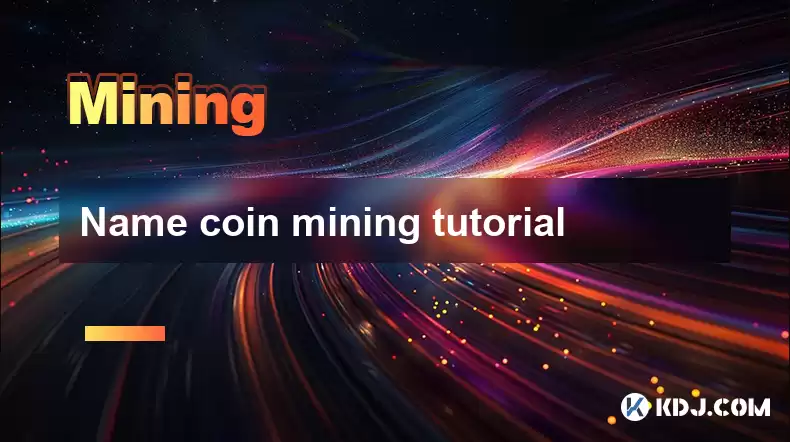-
 bitcoin
bitcoin $87959.907984 USD
1.34% -
 ethereum
ethereum $2920.497338 USD
3.04% -
 tether
tether $0.999775 USD
0.00% -
 xrp
xrp $2.237324 USD
8.12% -
 bnb
bnb $860.243768 USD
0.90% -
 solana
solana $138.089498 USD
5.43% -
 usd-coin
usd-coin $0.999807 USD
0.01% -
 tron
tron $0.272801 USD
-1.53% -
 dogecoin
dogecoin $0.150904 USD
2.96% -
 cardano
cardano $0.421635 USD
1.97% -
 hyperliquid
hyperliquid $32.152445 USD
2.23% -
 bitcoin-cash
bitcoin-cash $533.301069 USD
-1.94% -
 chainlink
chainlink $12.953417 USD
2.68% -
 unus-sed-leo
unus-sed-leo $9.535951 USD
0.73% -
 zcash
zcash $521.483386 USD
-2.87%
Name coin mining tutorial
Successful cryptocurrency mining requires choosing a profitable coin, selecting appropriate hardware and software, optimizing the mining rig, and continuously monitoring and adjusting the operation for maximum profitability.
Jan 11, 2025 at 01:29 am

Coin Mining Tutorial
Key Points:
- Selecting a cryptocurrency with a profitable mining potential
- Choosing the right mining hardware and software
- Setting up your mining rig
- Joining a mining pool (optional)
- Monitoring and optimizing your mining operation
Step 1: Choose a Coin with Profitable Mining Potential
The profitability of mining a particular cryptocurrency depends on several factors, including its market value, network difficulty, and block reward. Research different coins to identify those with the highest potential for profitability. Consider the following factors:
- Market value: The higher the market value, the more profitable mining can be.
- Network difficulty: The more miners competing to solve blocks, the higher the difficulty. Higher difficulty means lower profitability.
- Block reward: The amount of cryptocurrency awarded for solving a block. Coins with higher block rewards are more profitable to mine.
Step 2: Select Mining Hardware
Mining hardware, also known as ASICs (Application-Specific Integrated Circuits), is specialized equipment designed for mining cryptocurrencies. Choose hardware that is compatible with the coin you intend to mine and has sufficient hash rate, which determines its processing power. Consider the following:
- Hashrate: Measured in hashes per second (H/s), it indicates the hardware's mining power. Higher hashrate means more potential profits.
- Power consumption: ASICs consume a significant amount of electricity. Calculate the cost of electricity before investing in hardware.
- Price: ASICs can be expensive, so factor in the cost of hardware when estimating profitability.
Step 3: Choose Mining Software
Mining software connects your hardware to the cryptocurrency network. It controls the mining process and communicates with the blockchain. Different mining software is optimized for specific coins and hardware, so choose software that is compatible with your setup. Consider the following:
- Compatibility: Ensure the software supports the coin you intend to mine and your mining hardware.
- Features: Different software offer various features, such as monitoring tools, automatic configuration, and support for mining pools.
- Cost: Some mining software may have associated costs, such as licensing fees or subscription plans.
Step 4: Set Up Your Mining Rig
Once you have chosen your hardware and software, set up your mining rig. This involves physically connecting the hardware, installing the software, and configuring the settings. Consider the following:
- Ventilation: ASICs produce heat, so provide adequate ventilation to prevent overheating.
- Power supply: Ensure your rig has a stable power supply. Consider using uninterruptible power supply (UPS) to protect against power outages.
- Configuration: Set up your mining software to connect to the appropriate mining pool and calibrate your hardware for optimal performance.
Step 5: Join a Mining Pool (Optional)
Mining pools combine the computing power of multiple miners to increase their chances of solving blocks and earning rewards. Joining a mining pool is optional, but it can improve profitability, especially for miners with limited hash rate. Consider the following:
- Pool fees: Mining pools typically charge fees for their services. Choose a pool with competitive fees.
- Pool size: Larger pools have higher chances of finding blocks but may distribute rewards among more miners.
- Reputation: Research the pool's reputation, uptime, and reliability before joining.
Step 6: Monitor and Optimize Your Mining Operation
Once your mining rig is up and running, monitor its performance regularly. Observe the hash rate, power consumption, and profitability. Make necessary adjustments to optimize your operation and maximize earnings. Consider the following:
- Temperature monitoring: Overheating can damage your hardware. Monitor the temperatures and adjust ventilation or cooling systems as needed.
- Software updates: Keep your mining software up to date to ensure compatibility, stability, and potential performance improvements.
- Pool performance: Evaluate the performance of your mining pool and consider switching to a different pool if necessary.
FAQs
Q: What is the most profitable cryptocurrency to mine?A: The profitability of mining a cryptocurrency depends on market conditions and network difficulty. Conduct research to identify the most profitable coins at the time of mining.
Q: Which mining hardware is best for beginners?A: Start with entry-level ASICs with lower hash rate and power consumption. Consider hardware that is compatible with multiple coins to provide flexibility in mining options.
Q: Can I mine cryptocurrency with my home computer?A: While possible, mining with a home computer is not recommended due to low profitability and high energy consumption. ASICs are designed specifically for efficient cryptocurrency mining.
Q: What are the risks of cryptocurrency mining?A: Crypto currency mining involves volatility risk, hardware failure risk, and potential cybersecurity risks. Conduct thorough research and exercise caution to mitigate these risks.
Q: How long does it take to mine a block?A: Block mining time varies depending on the cryptocurrency, network difficulty, and miner's hash rate. It can take seconds, minutes, or even days to mine a block.
Disclaimer:info@kdj.com
The information provided is not trading advice. kdj.com does not assume any responsibility for any investments made based on the information provided in this article. Cryptocurrencies are highly volatile and it is highly recommended that you invest with caution after thorough research!
If you believe that the content used on this website infringes your copyright, please contact us immediately (info@kdj.com) and we will delete it promptly.
- Royal Mint 50p Coin: Rare Listing for Peter Rabbit Sparks Collecting Frenzy (and Caution)
- 2026-02-08 22:30:02
- Markets at a 2026 Turning Point: Navigating Volatility and Shifting Narratives
- 2026-02-08 22:15:01
- Bitcoin's Big Dip: Navigating the Crypto Market's Latest Volatility Wave
- 2026-02-08 22:10:02
- RWA Yacht Charter Hits the High Seas: Investing Yachts Docks Innovation with Tokenized Luxury
- 2026-02-08 22:20:02
- Bitcoin Mining Difficulty Plummets 11% in Largest Drop Since China Ban, Fueled by Price Slump and U.S. Storms
- 2026-02-08 22:00:01
- Heads Up, History Buffs! Super Bowl Coin Toss Flips a Franklin-Fueled Libertas Americana, Merging Gridiron Glory with Colonial Cool
- 2026-02-08 22:00:01
Related knowledge

How to mine crypto sustainably in 2026?
Feb 07,2026 at 04:20pm
Energy Source Optimization1. Miners increasingly deploy solar arrays directly on warehouse rooftops to power ASIC rigs during daylight hours. 2. Geoth...

How to mine Conflux on a standard gaming laptop?
Feb 07,2026 at 04:19am
Hardware Requirements for Conflux Mining1. Conflux uses a proof-of-work consensus mechanism called Tree-Graph, which is designed to be ASIC-resistant ...

How to buy hashing power on cloud mining platforms?
Feb 08,2026 at 05:59pm
Understanding Cloud Mining Contracts1. Cloud mining platforms offer users the ability to rent hashing power without owning or maintaining physical har...

How to mine Flux with a 30-series Nvidia GPU?
Feb 07,2026 at 02:40pm
Market Volatility Patterns1. Bitcoin price movements often exhibit sharp intraday swings exceeding 5% during low-liquidity windows, particularly betwe...

How to pay taxes on crypto mining income in 2026?
Feb 07,2026 at 01:20am
Tax Classification of Mining Rewards1. Cryptocurrency received as mining rewards is treated as ordinary income by most major tax jurisdictions includi...

How to find the lowest fee mining pools for BTC?
Feb 07,2026 at 01:00pm
Fee Structure Transparency1. Most reputable BTC mining pools publish their fee schedules directly on their official websites, often under sections lab...

How to mine crypto sustainably in 2026?
Feb 07,2026 at 04:20pm
Energy Source Optimization1. Miners increasingly deploy solar arrays directly on warehouse rooftops to power ASIC rigs during daylight hours. 2. Geoth...

How to mine Conflux on a standard gaming laptop?
Feb 07,2026 at 04:19am
Hardware Requirements for Conflux Mining1. Conflux uses a proof-of-work consensus mechanism called Tree-Graph, which is designed to be ASIC-resistant ...

How to buy hashing power on cloud mining platforms?
Feb 08,2026 at 05:59pm
Understanding Cloud Mining Contracts1. Cloud mining platforms offer users the ability to rent hashing power without owning or maintaining physical har...

How to mine Flux with a 30-series Nvidia GPU?
Feb 07,2026 at 02:40pm
Market Volatility Patterns1. Bitcoin price movements often exhibit sharp intraday swings exceeding 5% during low-liquidity windows, particularly betwe...

How to pay taxes on crypto mining income in 2026?
Feb 07,2026 at 01:20am
Tax Classification of Mining Rewards1. Cryptocurrency received as mining rewards is treated as ordinary income by most major tax jurisdictions includi...

How to find the lowest fee mining pools for BTC?
Feb 07,2026 at 01:00pm
Fee Structure Transparency1. Most reputable BTC mining pools publish their fee schedules directly on their official websites, often under sections lab...
See all articles





















![Is This a REAL Reversal or Fake out?? I wouldn't Get Excited Just Yet... [20 Min emergency stream] Is This a REAL Reversal or Fake out?? I wouldn't Get Excited Just Yet... [20 Min emergency stream]](/uploads/2026/02/08/cryptocurrencies-news/videos/origin_698897450a654_image_500_375.webp)


![Mesocosmos (By Biskotos) [All Coins] | Geometry Dash Mesocosmos (By Biskotos) [All Coins] | Geometry Dash](/uploads/2026/02/08/cryptocurrencies-news/videos/origin_69889be2eac64_image_500_375.webp)

















































